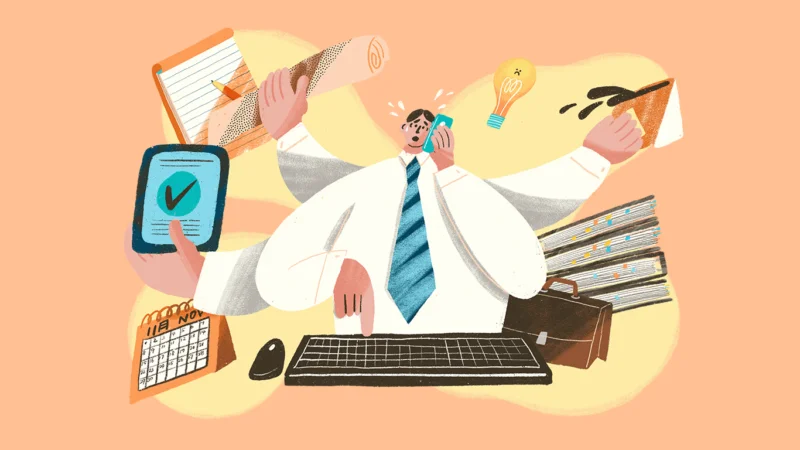Parental burnout during the COVID-19 pandemic
The ever-shifting demands of working parents

Ruby Liu MY
Register for free
One-stop online mental health self-help platform.

During the global pandemic, we are bombarded with information and changes everyday, ranging from work, family, friends to different social issues. In the hustle and bustle of everyday life, it can be common for parents to put themselves last. Juggling between demands, whether they are related to career, partner, children, parents or myriad other combinations, lives of working parents can be demanding and stressful, possibly leading to parental burnout. Can we ever attain an equilibrium?
Last year, McKinsey, a global consulting firm, conducted a mental health survey with 3,007 employees, with 862 of them being parents. The survey showed that, compared with nonparents, employed parents are twice as likely to strongly agree that they -
-
are
worn out
at the end of the day,
-
used to find their work more interesting,
- sometimes think their work is insignificant .
73% of parents with symptoms of burnout reported that the demands of their work interfere with their private and family life. Meanwhile, the pressures of being a parent mixed with the demands of work bring them feelings of apathy and fatigue, making them feel that they are failing to live up to their own expectations across their multiple social roles. Constantly switching roles from partner, to employee, to parent, to caregiver, working parents may find it almost impossible to have a recovery period that allows them to ease stress. Challenges, such as financial instability, social isolation, lack of resources, arisen from the pandemic may further exacerbate parental burnout.

Parental burnout: What is it? Time to revive our parenting passion
In psychology, parental burnout is a condition characterized by chronic overwhelming exhaustion, emotional distancing/ detachment from one’s children, a sense of parental ineffectiveness and loss of fulfillment stemming from one’s parental role.
It is worth noting that emotional detachment is a common symptom for both parental and job burnout. For parental burnout, parents become less and less involved in the relationship with their children, they become emotionally distant from their children with increasing apathy, interactions become limited to functional/ instrumental aspects, gradually losing the pleasure of being with their children that they used to have.
The study pointed out that the consequences of parental burnout include depressive symptoms, addictive behaviors, sleep disorders, couple conflicts, as well as escape ideation, which is similar to the Cantonese slang ‘‘Running away is shameful, but helpful.’’ Parental burnout is also associated with child neglect and parental violence.
Who experiences parental burnout?
Researchers have found that parents are at the greatest risk for parental burnout when they-
- aim to be perfect parents
- are more sensitive and prone to anxiety
- receive limited emotional or practical support from the co-parent
- have room for improvement in child rearing practices
- have to attend to children with special needs
- work part-time or are stay-at-home parents

How to cope with parental burnout?
Children have to release energy while parents need to gain theirs back. To prevent or alleviate parental burnout, parents can first practice mental self-care, communicate with partners and express their needs, seek resources from different organizations, or communicate with other parents and professionals, thus gradually strengthening their parenting resources and skills.
-
Partner co-presence
Research has shown that mothers reported greater enjoyment of housework and interactive childcare with a partner present. One of the main reasons is that partner co-presence brings a greater sense of well-being and meaning, boosting self-esteem, and promoting family bonding. This emotional support can be extended to work, inculcating mental vitality and resilience to the workplace, thus enhancing work performance.
-
Make a daily task list
Parents can prepare a daily bucket list that contains all personal, family, and work tasks in one. For instance, sending children to interest classes, collecting parcels from courier service, or meeting a project deadline. Prioritizing tasks according to importance, urgency, time needed, and reward; make good use of a timetable to differentiate the possibility of conflicting tasks. Besides, making time for reflection on the meaning and satisfaction of parenting may help you to anchor your intentions of being a parent.

Mindfulness activities for families - Learn to embrace all types of weather
As kids are having an early summer in Hong Kong, instead of busy finding hobby classes to “fill the blank”, could parents experience the learning journey with their kids together through mindfulness?
Training parents and kids to feel, observe, and understand their emotions is beneficial to their emotional intelligence management in the future. In Hong Kong, different organizations provide parental mindfulness classes. Through activities such as breathing and body scan exercises, five senses exercise etc., parents and children can practice mindfulness, enabling body-mind connections, and fostering a sense of calmness and relieving anxiety. This way, parents and children can explore their body-mind conditions together, recognize when mood fluctuates, embrace the fact that emotions are natural and fleeting just like the weather, and appreciate the beauty of impermanence.
Taking a dip in the sea is a pleasure - our mind, body, and soul get along swimmingly. For a long-distance swimmer who keeps swimming without rest and recovery of energy, one may get lost and exhausted, failing to enjoy but only float in the sea with fatigue. Likewise, parents are swimmers in their own ocean; they are encouraged to be aware of their source and level of pressure.
Fellow parents, please be gently reminded that you can express your needs to partners, friends, companies, to get connection and support whenever needed, for the sake of your mental well-being.
Despite the ever-changing situation brought about by the pandemic, let’s not forget the importance of self-care. We are all in this together.
References:
Mikolajczak, M., Gross, J. J., & Roskam, I. (2019). Parental Burnout: What Is It, and Why Does It Matter? Clinical Psychological Science, 7(6), 1319–1329. https://doi.org/10.1177/2167702619858430
Dunatchik, Allison, and Svetlana Speight. (2020). “Re-examining How Partner Copresence and Multitasking Affect Parents' Enjoyment of Childcare and Housework.” Sociological Science 7: 268-290. https://sociologicalscience.com/articles-v7-11-268/
ten Brummelhuis, L. L., & Bakker, A. B. (2012). A resource perspective on the work–home interface: The work–home resources model. American Psychologist , 67(7), 545–556. https://doi.org/10.1037/a0027974
Diana Hill, Ph.D. March 7, 2022. How to Revive from Parental Burnout. https://www.psychologytoday.com/us/blog/striving-thriving/202203/how-revive-parental-burnout
Erica Coe, Kana Enomoto, Brad Herbig, Ashish Kothari, and Jeris Stueland. December 17, 2021. COVID-19 and burnout are straining the mental health of employed parents. https://www.mckinsey.com/industries/healthcare-systems-and-services/our-insights/covid-19-and-burnout-are-straining-the-mental-health-of-employed-parents
Ahona Guha. January 29, 2022. Burnt-Out and Struggling to Prioritize Tasks. https://www.psychologytoday.com/us/blog/prisons-and-pathos/202201/burnt-out-and-struggling-prioritize-tasks
Guy Winch Ph.D. June 22, 2016. 10 Real Risks of Multitasking, to Mind and Body. https://www.psychologytoday.com/us/blog/the-squeaky-wheel/201606/10-real-risks-multitasking-mind-and-body
Ashley Abramson. October 1, 2021. The impact of parental burnout. What psychological research suggests about how to recognize and overcome it. https://www.apa.org/monitor/2021/10/cover-parental-burnout

Ruby Liu MY
Well-being Promotion Officer of Jockey Club TourHeart+ Project

